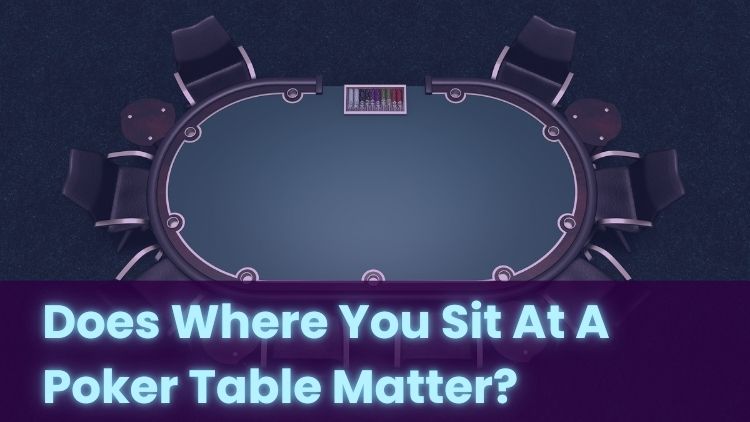
Have you ever wondered whether or not your seat at the poker table affects your game? You might think it’s just down to chance or that all seats are the same, but there’s more to it than meets the eye.
Different positions at the table can change the way you strategise and play your hand.
In this post, we’re going to discuss why your seat choice could be more important than you think and reveal if any particular seat can be crowned as the best one.
Does Your Position at a Poker Table Make a Difference?
When you play poker, your seat at the table isn’t just a place to sit - it’s an important part of your overall game strategy.
The position you have in a poker game refers to where you sit around the table in relation to the dealer, and it can affect the order in which you play your hand.
Having a late position means that you get to see how other players are betting before you make your move - this can give you useful information about their hands and help you decide what to do next.
On the other hand, if you’re in an early position, you have to act without seeing how most of the other players have bet. This can put you at a disadvantage since you have less information to guide your decision; however, it can offer a better opportunity to set the pace for the round.
Understanding the benefits and challenges of your position can help you make better choices, whether to bet, check, or fold. Knowing how to make the most of different positions is a skill that players develop with practice.
What Is The Best Seat Position In Poker?
In poker, the best seat is often considered to be those in the later positions - this includes the dealer, also known as the ‘button’, and the seats to the right of the dealer, called the ‘cut-off’.
Being in a late position means you get to see how most other players act before you decide what to do - this gives you more information to make better choices about your hand.
The dealer's seat, or "button," is particularly powerful because it acts last in most betting rounds. This advantage allows you to gather information from everyone else’s moves before deciding on your own.
The "cut-off" seat, directly before the dealer, is also strong. It provides valuable insights into the strength of other players' hands, allowing you to play more strategically.
While late positions are favoured, it's important to remember that being aware of your position is just one aspect of playing poker well. Every seat at the table has its own advantages and challenges. For example, earlier positions can set the tone and pace of rounds, which may help strategies involving bluffing and more.
Do Casinos Let You Change Seats at a Poker Table?
Whilst technically you are allowed to change seats at a poker table, there are some rules to consider that can vary from casino to casino.
If you wish to move to a different seat, the first step is to ask the dealer or the floor staff if it’s allowed - they can let you know if a seat is available and if changing is permitted at that time.
Usually, you will need to wait for a vacant seat before you can switch - some casinos might also have a waiting list, so it’s a good idea to express your interest early on.
Keep in mind that at certain points during the game, seat changes may be restricted in order to ensure fairness for all players. Playing poker is all about being considerate to your fellow players and following the specific casino’s guidelines.
Can You Sit at a Poker Table Without Playing?
Sitting at a poker table without actually involving yourself in the gameplay is often referred to as “sitting out”. Sometimes, casinos will allow observers to do this, but there are rules to keep in mind.
Casinos might let observers sit at a table, especially if it’s not a particularly busy time. However, it’s best to ask the dealer or floor staff for permission first.
If you do get a seat but don’t play, be aware that you’ll still need to follow table etiquette - this means not disturbing players who are actively involved in the game.
There are also friendly home games where sitting and watching can be a little more relaxed - just ensure that everyone at the table is comfortable with it first, and make sure to be respectful of those playing.
Whether in a casino or at home, always make sure you respect the players and the rules of the game. This way, everyone can enjoy the experience.
**The information provided in this blog is intended for educational purposes and should not be construed as betting advice or a guarantee of success. Always gamble responsibly.
